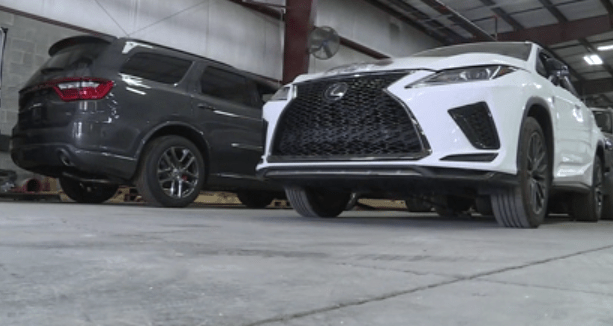RICHMOND, Va. (WRIC)- On Friday, a bill that would make it easier to sue police officers for violating a person’s constitutional rights died in the Virginia General Assembly.
The effort to eliminate qualified immunity in the Commonwealth first came to the forefront following the death of George Floyd, which sparked weeks of racial justice protests and calls for police accountability. It quickly emerged as one of the most controversial topics of a special session that lasted for more than 80 days in 2020.
This is the second time in the past six months that a push to remove the legal shield for law enforcement has failed. This time, it came at the hands of the House Courts of Justice Civil Sub-Committee, which endorsed the legislation last fall.
A more limited version of the bill lives on in the Senate, where the previous effort reached a dead end.
The Senate Judiciary Committee is expected to decide its fate in a meeting on Monday morning.
A blow in the House
The House bill from Del. Jeff Bourne (D-Richmond) would’ve created a state cause of action allowing a citizen to be awarded damages if a law enforcement officer violates their constitutional rights. Notably, the legislation would’ve eliminated an officers ability to plead sovereign immunity in state court or qualified immunity in federal court.
Supporters of the bill generally argue that qualified immunity sets an ‘extremely high’ bar that makes it difficult–though not impossible–for a victim to be compensated in civil lawsuits against officers. Opponents say the protection is essential in a job that requires split-second decisions and eliminating it will lead to ‘frivolous lawsuits.’
The House bill introduced in the 2021 session was largely the same as the one from 2020, according to Bourne. The main difference, he said, was a $25,000 cap on damages that an individual officer could be responsible for paying out of pocket. Bourne said this has has been done in Colorado.
Del. Marcus Simon (D-Fairfax) made the motion to table the bill with the understanding that it would be prioritized by the Virginia Crime Commission for further study.
“In an effort to really keep this moving forward…and to try to bridge some of the gaps between the two sides,” Simon explained.
The motion was supported by a vote of 6-2.
“I just hope we can have an honest policy discussion at the Crime Commission level rather than be victim to this vitriolic language that seems to cloud and confuse folks on what this is actually seeking to do,” Bourne told the sub-committee.
Bourne didn’t respond to an interview request on Friday.
A second chance in the Senate
A scaled back version of the bill may be Democrats last chance to take action in this area before elections later this year threaten the party’s control in the state legislature.
Sen. Scott Surovell (D-Fairfax) said his bill would create civil liability in any situation where a law enforcement officer violates state laws, including recent bans on choke holds and shooting at a moving vehicle. He said it would also apply to statutes that set standards for the use of deadly force and intervention in cases of excessive force.
“All this bill does is creates an additional incentive for a law enforcement officer to follow the standards that the General Assembly adopted,” Surovell said. “If the standards are followed, then there is nothing to worry about.”
While its still opposed by the law enforcement community, the Senate bill is different than the House version in some key ways.
Surovell said Bourne’s legislation would’ve applied to nearly all interactions with law enforcement, which several Senate Democrats considered “too broad.” Also, in the Senate bill, the locality in which an officer is employed would be liable for damages as opposed to the officer themselves.
“No police officer is going to lose their house or lose their car because of this bill,” Surovell said.
Asked if he has the votes to get it passed, Surovell said he hasn’t had an opportunity to talk to his caucus about it.
“All I can tell you is that the bill that I drafted was based on conversations that I had with members of my caucus during the special session when the qualified immunity bill was coming through and, based on those conversations, I thought this bill was one that would be able to get some traction,” Surovell said.
Law enforcement families in limbo
As conversations over officer accountability continue, law enforcement families say the uncertainty is taking a toll.
Mary Ramirez is married to a police officer. She’s among the founding members of “Blue Line Families of Virginia,” a grass roots advocacy group that grew out of the police reform debate in the special session.
“We felt like we didn’t have a seat at the table,” Ramirez said. “We wanted to be heard this time.”
The group didn’t have the opportunity to be heard during limited public comment on Friday, though many members of the law enforcement community spoke to ongoing issues with officer retention and recruitment.
Virginia State Police Association Executive Director Wayne Huggins said–between Dec. 2020 and Jan. 2021–36 troopers have left the force. He said there are about 300 vacancies overall.
“I have personally cried and begged my husband to leave the department but he loves helping others,” Ramirez said. “It was his childhood dream to be a police officer.”
Ramirez said qualified immunity gives families like hers peace of mind. She said the debate over eliminating it and to what degree individual officers should be financially liable has caused them a lot of stress.
“We’ve actually debated on filing for a divorce and putting everything into my name so that they can’t take our home,” Ramirez said.










































































































